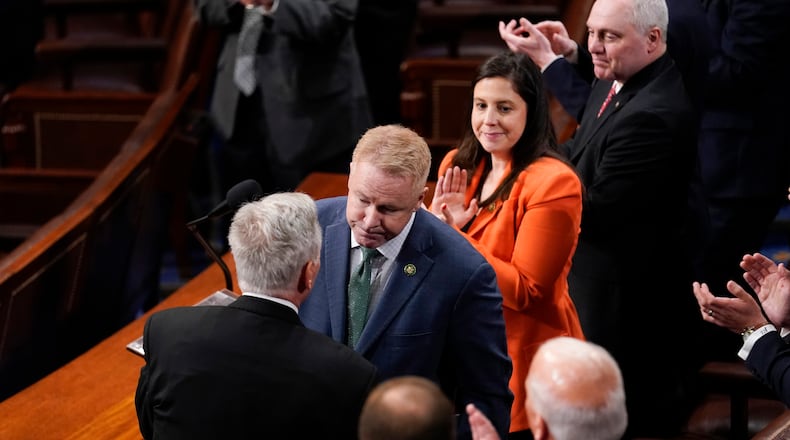For a few hours, the GOP plan was in trouble, as Davidson criticized fellow Republicans for always making promises about spending cuts, but rarely following through.
“With or without GOP majorities, we get more government and bigger deficits,” Davidson posted on X.
But after initially refusing to get on board with his party’s leaders, Davidson suddenly changed his mind following some last-minute negotiations. The Ohio Republican said he was promised that Republicans would include spending cuts in a government funding plan which needs action in Congress by March 14.
“I finally received the assurances I needed that there will be cuts to discretionary spending,” Davidson said.
How important was his change of heart? If Davidson had voted against his party’s plan — as he had threatened for days — that GOP budget blueprint would have failed on a tie vote.
Instead, the last-minute switch by Davidson helped Republican leaders clear a first procedural hurdle in the House on President Trump’s agenda. The final vote was 217-215. All Democrats were opposed. Only one Republican, U.S. Rep. Thomas Massie, R-Kentucky, voted ‘No.’
Republicans in the House and Senate still have to reach a deal on a budget outline, and only then can GOP leaders start forging what President Trump often refers to as “one big, beautiful bill.”
“This is just a conceptual first step,” said U.S. Rep. Mike Turner, R-Dayton, who acknowledged that it may take months for House and Senate Republicans to work out a final agreement on the details of a massive tax and budget measure.
“That’s going to be very hard to do,” Turner added, even as Davidson was being pressured by fellow Republicans out on the House floor. “But I think we’ll find a path that will be best for the American public and will be best for us to find ways to save the American taxpayer and rein in spending.”
While the House GOP plan would cut government spending, it would still allow for larger federal budget deficits — it paves the way for up to $4.5 trillion in new tax cuts over 10 years.
Figures provided by the GOP show the House-passed budget outline would add about $19 trillion in deficits over the next decade, taking the national debt from $36 trillion currently up to an estimated $55 trillion.
It’s one reason Davidson and other GOP conservatives keep grumbling about their party’s campaign pledges on spending.
“The GOP always promises a smaller, more accountable government,” Davidson said. “When has that occurred?”
About the Author
